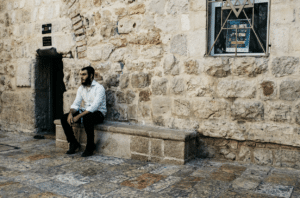The phrase, “Let my people go”, aside from evoking the dulcet tones of Louis Armstrong, has a wonderful meaning in Hebrew. And the clue is in the rest of the sentence. Most people never finish the sentence.
Moses was sent by God on one heck of a mission. His job—at least the first part of it—was to demand the immediate release of about a million Israelites from cruel bondage. To insist that Pharaoh should allow the Hebrew slaves, his free workforce, to just leave. What a ridiculous request. But it wasn’t really a request. With God behind him, Moses was in fact laying down the law, with all the authority of the King of the Universe. It seems like Moses didn’t feel like he had that authority though. With his brother Aaron at his side for emotional support, Moses ventured back to the place he grew up to face the tyrannical ruler, Pharaoh, no doubt with some trepidation:
Afterward Moses and Aaron went and said to Pharaoh, “Thus says the Lord, the God of Israel, ‘Let my people go, that they may hold a feast to me in the wilderness.’” (Exodus 5:1)
But that wasn’t quite the message God had told him to say, was it? Moses and Aaron appear to be asking for a temporary excursion for the Hebrew slaves. A short trip, a picnic in the Egyptian outback. God was demanding total release.
“Come,” said God to Moses. “I will send you to Pharaoh that you may bring my people, the children of Israel, out of Egypt.”
But Moses said to God, “Who am I that I should go to Pharaoh and bring the children of Israel out of Egypt?”
He said, “But I will be with you, and this shall be the sign for you, that I have sent you: when you have brought the people out of Egypt, you shall serve God on this mountain.”
(Exodus 3:10-12)
God’s plan was to bring them completely out of Egypt in a very real and permanent manner—there would be no going back. And that they would meet Him over at Mount Sinai in the land of Midian, where He’d appeared in the burning bush. There He would establish His covenant with the whole house of Israel and make them a holy people with a holy calling. Then He would lead them on to the Promised Land. But Moses tries to soften the blow and paints it as a one-off religious event out in the desert. It was no such thing. It was a categorical extraction. An exodus.
Fortunately, God was prepared for this, and knowing that it wouldn’t matter how nicely they asked Pharaoh would never agree, had a few tricks up His sleeve. With each plague, or blow, as it is in Hebrew, God’s demand intensified: “Let my people go!”
Sent on a mission
In English it sounds like a passive response is required: Instead of holding tight, release your grip.
But in Hebrew it’s quite another thing: שַׁלַּח אֶת-עַמִּי means “SEND my people”.
Moses was essentially commanding Pharaoh to SEND the people of Israel into their destiny.
This throws interesting light on what was actually happening in the Exodus. God was killing multiple birds with one stone. He had waited for the sin of the Amorites to reach its full measure (Genesis 15:16) before executing justice on them and giving the land to the tribes of Israel. He rescued His covenant people from their living hell, and thew the Egyptians into the sea just as they had thrown countless Hebrew babies into the Nile. He was fulfilling His promises to the patriarchs to bring their descendants back to the Land of Promise, and establishing a faith community that would carry His word and His light to the whole world.
They were not just being taken out of Egypt, they were being SENT out, with a mission: to be a light to the Gentiles.
God often does both-and rather than either-or. He operates on multiple levels all the time. We often have no idea how many facets there are to God’s actions and decisions, and can foolishly interpret them to be all about us… our own life, family, community or nation. But God has a very wide-angle lens. His ways are perfect and nothing is ever wasted in His economy. God brought deliverance and blessing to the descendants of Abraham, Isaac and Jacob in fulfillment of His promises to them. They would receive their inheritance from His hand, along with blessings of spiritual nourishment, revelation, and life, which they were to pass on to all the nations of the world.
The command to “Let my people go” forced Pharaoh to send Israel out of slavery and into their global calling, into their destiny. In a similar manner, we have been delivered from slavery and death by the blood of the sacrificial lamb, and brought through the waters of baptism. But God’s rescue mission wasn’t so we could sit around and eat cake—we are also sent into the world with a calling and a destiny! Whenever we thank God for His amazing salvation, His perfect plans, and the future He has prepared for us, let’s ask Him again: What is my part in Your plans and purposes? What are You sending me to do?
Then I heard the voice of the Lord saying, “Whom shall I send? And who will go for us?”
And I said, “Here am I. Send me!”
(Isaiah 6:8)
Photo by Andrés Dallimonti on Unsplash















